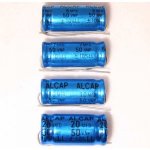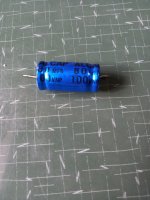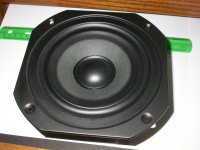Btw is there marked LL or not on the Alcap ?
LL = Low Loss, as marked on the Alcaps in the attachment.
That obviously makes them better!
Attachments
The Alcaps from Falcon Acoustics are specified Loss Factor D <0.10 @ 1kHz.
Is that LL enough, diyiggy?
Is that LL enough, diyiggy?
Yup I know, question was for the op in order to pick up the rigth one... Bur two normals standard 47uF plus 33 uF in parrallel have esr reduced per two if not 80 uF from a standalone LL ???LL = Low Loss, as marked on the Alcaps in the attachment.
That obviously makes them better!
Can’t say for sure, but my guess is no.Do you think the spider has to be renewed as well ?
Yup I know, question was for the op in order to pick up the rigth one...
I knew who the question was for, I was simply explaining to him what "LL" meant.
I do not know but I suspect a LL or not are close at 1Khz and certainly realy close at 100 hz? Anorher story at 5 kHz and more at 10 Khz where a LL aka smoorh foil can have less loss than some mylars if my memory serves me well. My understanding is low but I remember Kef used LL for global impedance smoothing and also as low pass...It may be possible this Proac has its Alcap marked LL. If so it is equal at ATBIG serie at Mundorf or F&T...i e. Smoorh foil when written on datasheets. Here mkp caps swap should work then. 80 uf Solen SCR is 20 euros at tlhp.com. Size will ask imagination though...The Alcaps from Falcon Acoustics are specified Loss Factor D <0.10 @ 1kHz.
Is that LL enough, diyiggy?
Oh...it is for Luca as I know you know it better than I ever will. 🙂
I know enough about the imperfections of capacitors to get by. I could even calculate the ESR. However, I don't agonise over the imperfections of capacitors as loudspeakers have a host of other imperfections!
I played a little with quality recaps on my main. Well, it helps. Sometimes lythics are good enough though.
My Proac have one ALCAP electrolytic as well.
Proac loves those capacitors it seems.
im gonna change mine with a low cost Solen, but I don’t know how it will affect the sound.
like I said Proac uses those caps all the time. Maybe a staple to their sound some how.
do know. But I’ll find out if putting a poly cap in its place takes away from the speakers vibe.
I’ve seen a video of similar speakers and many posted that the alcap in the specific place is connected to an inductor and doesn’t effect the sound at all.
Proac loves those capacitors it seems.
im gonna change mine with a low cost Solen, but I don’t know how it will affect the sound.
like I said Proac uses those caps all the time. Maybe a staple to their sound some how.
do know. But I’ll find out if putting a poly cap in its place takes away from the speakers vibe.
I’ve seen a video of similar speakers and many posted that the alcap in the specific place is connected to an inductor and doesn’t effect the sound at all.
i just checked the electrolytic capacitors. The meter measures 91 instead of 100 ... a little out of specs.
i will order new el caps from falcon acoustic with 2% tolerance.is the same cap, perhaps the engineers of Proac had their good reasons for using this type of capacitor, since the rest of the components are not of economic level (solen caps ...). I would also like to replace the 2 resistors with non-inductive ones of better tolerance.I believe this will not affect the sound and give more stability to the circuit.I found some 6.80ohm 10W - "Superes" Jantzen Audio Wirewound non-inductive resistor - 1% tolerance.
I decided to leave the other components as they are, including the drivers.they may have been built "to manufacturer specifications", and it would be difficult to work with. they sound good, and I don't want to replace them.
are there any products to keep the rubber suspension of the midwoofers soft?
i will order new el caps from falcon acoustic with 2% tolerance.is the same cap, perhaps the engineers of Proac had their good reasons for using this type of capacitor, since the rest of the components are not of economic level (solen caps ...). I would also like to replace the 2 resistors with non-inductive ones of better tolerance.I believe this will not affect the sound and give more stability to the circuit.I found some 6.80ohm 10W - "Superes" Jantzen Audio Wirewound non-inductive resistor - 1% tolerance.
I decided to leave the other components as they are, including the drivers.they may have been built "to manufacturer specifications", and it would be difficult to work with. they sound good, and I don't want to replace them.
are there any products to keep the rubber suspension of the midwoofers soft?
Try a light application of Silicone Lubricant (sold, for example, as Dry Lube).
If bought in a spray can, then spray some of the lubricant into a small container and allow time for the spray propellant to evaporate before use.
Apply sparingly with a small artists brush and avoid getting any of the lubricant on the speaker cone.
If bought in a spray can, then spray some of the lubricant into a small container and allow time for the spray propellant to evaporate before use.
Apply sparingly with a small artists brush and avoid getting any of the lubricant on the speaker cone.
sorry,it measures 91 instead of 80P.S. I thought the electrolytic was 80uF, so how did your 100uF figure come about?
there's no LL marking. I think those from Falcon acoustic with 2% tolerance will be fineLL marking on it?
As I understand it, there is no cure, especially when the butyl rubber shows brittleness or even cracks. But applying paraffin (often the main ingredient of lamp oil) makes it weak again, thus letting the cone move more freely.are there any products to keep the rubber suspension of the midwoofers soft?
i will order new el caps from falcon acoustic with 2% tolerance.is the same cap, perhaps the engineers of Proac had their good reasons for using this type of capacitor...
That's a good direct substitute for the existing Alcap.
The 2% tolerance version, at £4.28 including VAT, is unsurprisingly more expensive than the 5% or 10% options
https://www.falconacoustics.co.uk/a...capacitor-nonpolarised-reversible-series.html
- Home
- Loudspeakers
- Multi-Way
- Proac response one crossover


